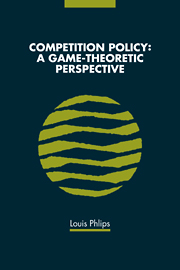11 - Predation in theory
Published online by Cambridge University Press: 23 September 2009
Summary
The theory of economic predation has a special and rather uncommon feature. Great sophistication is needed to show that predation can occur at all, and perhaps even greater sophistication is needed to show what distinguishes predatory prices from other types of prices. One reason is that predation appears, on simple intuitive grounds, as irrational or at least as impossible to reconcile with profit maximisation. Another reason is that one well-known line of reasoning in game theory leads to the conclusion that predation cannot be an equilibrium strategy.
To show that predation can be a profit-maximising equilibrium strategy, a number of particular circumstances have to be modelled. To begin with, for predation to make sense it has to be defined as an attack (in the form of a low price) by a monopolist against an entrant, after the latter has actually entered one of the monopolist's markets. Otherwise predation would be synonymous with entry-preventing limit pricing.
Second, this aggressor is typically a multimarket monopolist. If the aggressor operates in one market only, it can always protect it profitably by absorbing the entrant. Predatory pricing without merger has a chance to be the best strategy only if a low profit (or a loss) in one market can be compensated by larger profits in other markets. Predation thus appears in one market in order to protect the aggressor's other markets.
A further feature is that entrants must have incomplete information.
- Type
- Chapter
- Information
- Competition PolicyA Game-Theoretic Perspective, pp. 185 - 205Publisher: Cambridge University PressPrint publication year: 1995



